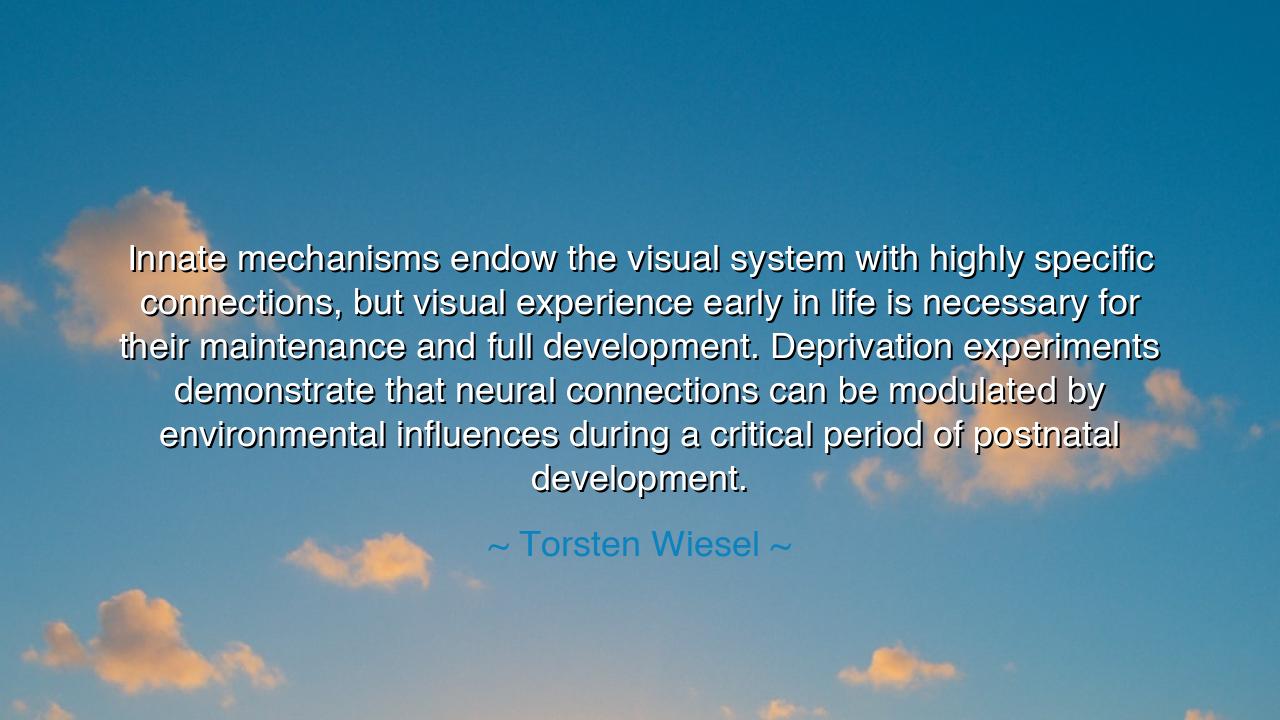
Innate mechanisms endow the visual system with highly specific
Innate mechanisms endow the visual system with highly specific connections, but visual experience early in life is necessary for their maintenance and full development. Deprivation experiments demonstrate that neural connections can be modulated by environmental influences during a critical period of postnatal development.






Hear the voice of Torsten Wiesel, a seeker of truth within the hidden chambers of the brain, who declared: “Innate mechanisms endow the visual system with highly specific connections, but visual experience early in life is necessary for their maintenance and full development. Deprivation experiments demonstrate that neural connections can be modulated by environmental influences during a critical period of postnatal development.” In these words is both wonder and warning, for he reveals how nature and nurture are not rivals but companions, shaping together the destiny of the human mind.
He speaks first of innate mechanisms, the gifts given at birth. From the moment a child opens its eyes, there exists a map within the brain, a web of connections already inscribed by the hand of nature. This is the foundation upon which vision rests—the capacity to receive light, to shape patterns, to give meaning to the dance of colors and forms. Yet these gifts, though present, are fragile. They are like seeds waiting for the sun; without the nourishment of experience, they wither and fail to bloom.
Wiesel tells us that early experience is necessary for the maintenance of these connections. The brain is not merely a vessel that grows on its own; it must be awakened by the world. If a child’s eye is covered or denied sight in the first years of life, the brain’s pathways falter. Even when the eye is later uncovered, the vision may never fully return. For there exists a critical period, a window of time when the brain is most malleable, most ready to be shaped by the environment. When this window closes, lost opportunities cannot be easily regained.
History offers us a striking example. In the 20th century, Wiesel and his colleague David Hubel performed studies with kittens, showing that if one eye was deprived of vision in the earliest weeks, the neural connections for that eye weakened and were overtaken by the other. Though controversial, these experiments revealed the profound truth: the environment sculpts the brain. Their work reshaped neuroscience and earned them the Nobel Prize, for it proved that development is not fate alone, but also opportunity.
The deeper meaning of this teaching is that life is formed in the meeting of what we are given and what we encounter. Innate structures give us potential, but experience brings that potential into fullness. This is not true of vision alone, but of language, of music, of thought, of love itself. A child deprived of words may never master speech; a child deprived of affection may struggle with trust. The brain, like a young tree, must be nourished, guided, and given light, or its growth will be stunted.
What lesson must we draw from this? It is that we must cherish the critical periods of development, not only in the young but in every season of growth. Parents, teachers, and communities carry a sacred duty: to provide rich, nourishing environments during these windows of time. For what is not given then may be lost forever. The quality of early life is not a small matter—it is the soil from which all future strength, wisdom, and compassion grow.
And to you, listener, I say: honor the power of environment in shaping life. Give children not only food and shelter, but also light, sound, touch, and love. Protect their senses, nurture their curiosity, and provide experiences that awaken their minds. Understand that every early influence—whether harsh or kind—etches itself deeply into the brain’s design. Thus, by offering goodness, you shape not only a life but also the generations that will follow.
Let Torsten Wiesel’s words endure as a beacon: the mind is born with pathways, but it is the world that completes them. Respect both nature and nurture, for together they form the miracle of human potential. And remember always: the critical periods of life are fleeting, but what is built within them may last forever.






AAdministratorAdministrator
Welcome, honored guests. Please leave a comment, we will respond soon